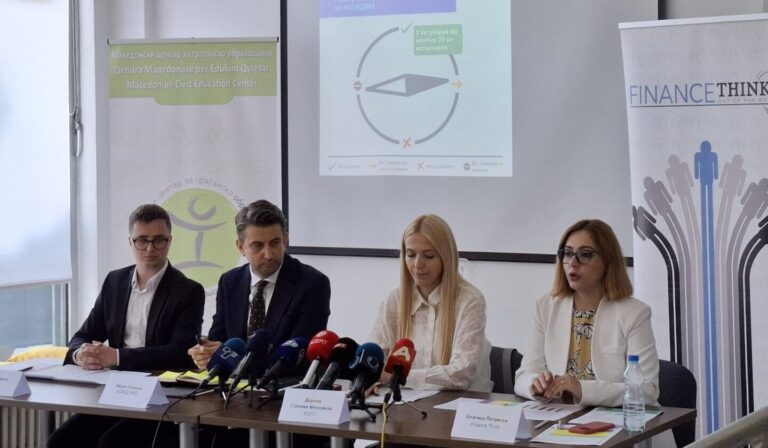Healthcare in the Clutches of Bureaucracy
Healthcare in the Clutches of Bureaucracy
Macedonia ranks third in Europe for cancer mortality, yet it does not even have a basic patient registry! How can the healthcare system develop a national strategy to fight serious illnesses such as cancer? How can it define a document that accurately summarizes prevention, disease prevalence, and mortality so that effective action can be taken? Over the years, Macedonia has failed to create a disease registry, particularly for malignant illnesses, which would simplify building a strategic plan to combat these diseases.
By: Ljubiša Arsić
In the first 12 hours of November 4 (Friday), the electronic system of “Moj Termin” registered around 20,000 referrals for patients and over 60,000 prescriptions issued. This data, presented in real-time on livedashboard.zdravstvo.com.mk, a site dedicated to “Moj Termin” and maintained by the Ministry of Health, allows for constant monitoring of referrals and prescriptions, with diagnoses most frequently appearing being I10 (essential hypertension), N40 (prostate hyperplasia), E10 (diabetes), and R10 (abdominal pain).
These online data could serve to accurately track patient health, identify the most common diagnoses, monitor therapies issued, and ultimately help define a comprehensive Disease Registry. This is just one way the health authorities could start developing this crucial document if the state genuinely intends to improve disease prevention, diagnosis, and treatment.
CANCER WILL CONSUME US UNTIL A REGISTRY IS ESTABLISHED
For example, according to World Health Organization projections, by 2020, cancer would become the leading cause of death worldwide. Macedonia is no exception, as the number of malignant patients is rapidly increasing despite the lack of precise statistics. This alarming reality should compel the authorities to define a national strategy, including prevention measures and a proper selection of medications, in order to reduce mortality rates.
To this end, the Association for the Fight Against Cancer, Borka, is collaborating with the pharmaceutical industry to advocate for reduced prices of new, modern cancer medications, and, if necessary, programs or donations to make these treatments accessible to patients. As a member of European cancer-fighting associations, Borka raises this issue at conferences across European capitals. Strong coordination between European pharmaceutical companies and Macedonian healthcare providers will be essential to ensure patients can access therapy and prevent cancer from becoming the leading cause of death.
However, how can the healthcare system develop a national strategy without a disease registry? Macedonia has not created a registry for diseases, particularly malignant ones, which is necessary to construct a strategic plan for combating illnesses.

“We do not have a registry of malignant diseases with precise data on new cases and mortality. What has been done since last year through the ‘Moj Termin’ reform and the implementation of the breast cancer screening program via free examinations will eventually provide some data. This will greatly facilitate our future work because we can act according to actual needs. Our efforts are focused on implementing a Cancer Control Strategy or National Plan, which in the next five to ten years would provide the figures needed to act. We must not forget that we are third in Europe in cancer mortality and cannot continue to rely on foreign data,” commented Biba Dodeva, president of Borka.
AUTHORITIES DON’T KNOW WHO IS RESPONSIBLE
Until 2010, as NGOs report, some data on disease statistics existed, but in recent years, access to official figures has become a mystery. Borka can initiate the creation of a registry, but this is ultimately the responsibility of the state health authorities. Instead of coordinating and unifying disease data—especially for malignant illnesses—they shift responsibility among themselves. Four months ago, Borka sent a request to the Institute of Public Health, logically the body that should have all data on new and deceased patients, to access data on newly registered cancer cases. The Institute responded that such statistics fall under the Ministry of Health. Following this, Borka contacted the Ministry, which redirected them back to the Institute.
“We also requested data up to 2010, as we know some statistics exist, but even that was not provided. With a disease registry, we would know how many patients are in diagnostics, receiving treatment, on therapy, or in prevention programs. This would allow us to procure modern therapies efficiently and plan the budget for medications rationally, as well as predict financial needs for prevention programs. Right now, everything is general, which is why inappropriate medications are used in practice,” explained Mirjana Babamova from Borka.
This raises the question: how does the healthcare system function without precise and final figures on diseases, and how can it define plans or strategies for prevention and treatment in the future? Attempts to obtain data from the responsible institutions revealed a lack of transparency.
At the Ministry of Health, officials categorically refused to discuss the topic, citing internal restrictions. At the Institute of Public Health, Dragan Gjorgjev explained that data from regional centers are processed monthly and annually, originating from clinics and hospitals, as well as emergency interventions. Mortality and cause-of-death data are obtained from the State Statistical Office.
MACEDONIAN DATA IS MISSING IN EUROPEAN STATISTICS
While local authorities claim to have data, their figures are neither relevant nor recognized by European statistical organizations, where Macedonia is obliged to submit health statistics. The main issue appears to be the lack of a clear definition for a disease registry. Data that do become available are outdated, incomplete, and inconsistent across institutions.

“Authorities always claim they have numbers, but these figures are not found in Eurostat, where Macedonia is obliged to submit them. No researcher can rely on these missing numbers. The ‘Moj Termin’ database is a good example of accurate data collection, but it is not synchronized. The idea of a registry is to track disease trends over the years, monitor mortality rates, and determine whether to focus on prevention or medication provision. The entire system is connected but requires real, accurate numbers expressed through a registry,” stated Vladimir Lazarevic from Healthgruper.
Currently, the IT infrastructure monitoring the “Moj Termin” system collects a wealth of data, but they are not effectively utilized or aligned with other institutions. Without precise figures, diagnoses, prevention measures, and therapies—in short, without a registry—there is no true healthcare.








